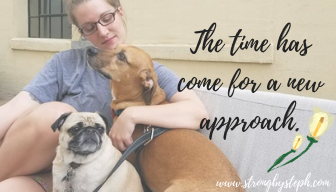When you’re in the soup of diet culture, believing your (allegedly unlovable, misshapen, wrong) body is all that you are, loving it can seem so far away it feels surreal.
Learning to detach our worth from our appearance doesn’t require that we actively love every inch of ourselves. It would be disingenuous and harmful to proclaim that feeling worthy of love, respect, and belonging can only happen once you love every inch of your body. But, maybe, we could get to a place where we all realize, with every waking moment and throughout every single interaction, we are more than our bodies (easy to say we know this, but how often are you on the receiving end of judgments about your ability to perform at work because of your gender presentation, for example? How often do you make assumptions about someone's strength or stamina because of their body size?).
When working with body image clients, one of the first things I invite them to do is to examine the language they use to describe their bodies. It is often illuminating how potent that vitriol can be.
Is it any wonder self-love feels far away when the script we play is a constant stream of, “gross,” “sluggish,” “lazy,” “flaky,” “undisciplined,” and the like?
All tagged language
Does It Feel Like, "Loving Your Body," Is Only For Other People?
I know many people who wake up every morning, and right before they look in the mirror to greet themselves for the day, they feel pure terror. Dread. Fear. We steel ourselves up to brace for the, "flaws," someone else has told us will be there, and we wonder how, "bad," they look that day, and the chorus starts:
"Ugh, gross."
"I can't wear that. Do I have any clean, flowy tops?"
"I'm giving a presentation today; will this hold across my chest?"
"I shouldn't have eaten ____ last night. I never get this right."
We've discussed it before, but it bears repeating: the language you're using has a measurable impact on your perspective.
Many clients come to me unhappy with their bodies, desperately hoping that the program I present will hold all the secrets to body change, and, as a result, happiness. They're disappointed to find out that it doesn't always work that way, and, in fact, countless repeated incidents of this led me to examine my coaching philosophy, such that I no longer coach with a focus on intentional fat loss.
Liking our bodies (and ourselves) is an inside job, one that can't be completed in an hour a day at the gym and a salad every night for dinner. It's a practice, and it often feels unreachable: how many times have you asked yourself, "how do I go from hating everything about my body to loving it? LOVING it?"
It seems a million miles away for a lot of us. It did for me.
How to Stop Hating Your Body
I've discussed it before, but it bears repeating: the language you're using has a tangible impact on your perspective.
Many clients come to me unhappy with their bodies, desperately hoping that the program I present will hold all the secrets to body change, and, as a result, happiness.
They're disappointed to find out that it doesn't always work that way (I do write great programs, of course, and ones that will help you find joy, but most people are surprised to discover that getting their dream body often feels different from how they thought it would.).
Liking our bodies (and ourselves) is an inside job, one that can't be completed in an hour a day at the gym and a salad every night for dinner. It's a practice, and it often feels unreachable: how many times have you asked yourself, "how do I go from hating everything about my body to loving it? LOVING it?"
It seems a million miles away for a lot of us. It did for me.
Stop Calling Yourself Gross.
An exercise I do with many of my clients is an examination of the words we choose to describe ourselves.
Many women come to me feeling things like, “gross,” “large and in charge,” and/or, “disgusting.”
I've been there, too, impugning my thighs for spilling over the sides of my chairs, deriding my stomach for flowing over my waistband, slamming my shoulders for ripping the seams of my shirts.
You're not alone in this shadow, but you also don't have to stay there.




